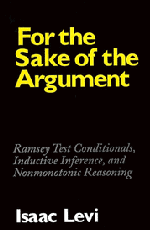 For the Sake of the Argument
For the Sake of the Argument Book contents
- Frontmatter
- Contents
- Preface
- For the Sake of the Argument
- 1 Introduction
- 2 Unextended Ramsey Tests
- 3 Modality without Modal Ontology
- 4 Aspects of Conditional Logic
- 5 Nonmonotonicity in Belief Change and Suppositional Reasoning
- 6 Inductive Expansion
- 7 Defaults
- 8 Matters of Degree
- 9 Normality and Expectation
- 10 Agents and Automata
- Notes
- Bibliography
- Name Index
- Subject Index
8 - Matters of Degree
Published online by Cambridge University Press: 04 May 2010
- Frontmatter
- Contents
- Preface
- For the Sake of the Argument
- 1 Introduction
- 2 Unextended Ramsey Tests
- 3 Modality without Modal Ontology
- 4 Aspects of Conditional Logic
- 5 Nonmonotonicity in Belief Change and Suppositional Reasoning
- 6 Inductive Expansion
- 7 Defaults
- 8 Matters of Degree
- 9 Normality and Expectation
- 10 Agents and Automata
- Notes
- Bibliography
- Name Index
- Subject Index
Summary
Default Conclusions as Degrees of Belief
The conclusion of an inductive inference is a coming to full belief.1 It entails a change in the agent's state of full belief and, in this respect, in one's doxastic commitment. Or, if the reasoning is suppositional, it is a full belief conditional on an inductively extended supposition. In both cases, the induction is a transformation of a corpus of full belief into another one. If default reasoning is a species of nonmonotonic inductive inference, the conclusion of a default inference must be representable by such a transformation.
It is far from clear, however, that students of default reasoning always understand the conclusions of default inference to be held so confidently. The inquirer might judge the conclusion as worthy of belief to some degree without coming to endorse it fully. In this sense, nonmonotonic reasoning need not involve inductive expansion to a new corpus of full beliefs.
What, however, is to be meant by a degree of belief or beliefworthiness? The currently fashionable view is that degrees of belief are to be interpreted as credal probabilities used in evaluating the expected values of options in decision problems.
There are alternative proposals. In particular, there is the interpretation as degrees of belief of measures having the formal properties first identified by G. L. S. Shackle (1949) and embedded in the b-functions described in section 6.7. Moreover, there are diverse proposals for ordinal or quantitative indices of beliefworthiness or inductive support such as the difference between a “posterior” probability and a “prior” probability, the ratio of a posterior and a prior, or the logarithm of such a ratio.
- Type
- Chapter
- Information
- For the Sake of the ArgumentRamsey Test Conditionals, Inductive Inference and Nonmonotonic Reasoning, pp. 234 - 268Publisher: Cambridge University PressPrint publication year: 1996


